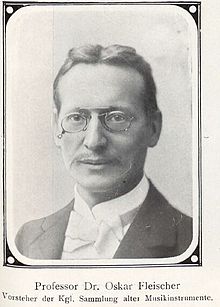Oskar Fleischer
Oskar Fleischer (born November 2, 1856 in Zörbig / Anhalt-Bitterfeld district , † February 8, 1933 in Berlin ) was a German musicologist .
Life
After visiting the Latin secondary school at the Francke Foundations in Halle , he studied from 1882 to 1886 at the city's university old and new languages, literature and philosophy and a doctorate Dr. phil. He then completed a four-year degree in musicology (with Philipp Spitta ) in Berlin. In 1888 he took over the management of the Royal Collection of Old Musical Instruments at the Hochschule für Musik , whose holdings he was able to expand significantly with the acquisition of Snoeck's private collection. From 1892 he worked as a private lecturer , from 1895 (until 1925) as an associate professor for musicology at the Friedrich-Wilhelms-Universität Berlin . His most famous students include the Mozart researcher Hermann Abert , Komitas Vardapet and his successor Curt Sachs . In 1899 he was a co-founder of the International Music Society and editor of its publications (anthologies of the International Music Society, magazine of the International Music Society). His main scientific area was less in the study of musical instruments, but in the research of medieval and ancient Greek chant scripts (new genesis). In the last years of his life he became an outsider with his attempt to reconstruct a “Germanic Neumenschrift” and published in the völkisch-national magazine Die Sonne . He carried the title of Privy Councilor .
After being reburied, he found his final resting place in the south-west cemetery in Stahnsdorf . A street was named after him in his hometown of Zörbig.
Fonts
- The Accentuation System Notkers in his Boethius , Halle 1882 (Diss.)
- Denis Gaulthier . In: VfMw 2 (1886), pp. 1–180
- Neumen studies. Treatises on medieval chanting notations . 3 volumes, volume I, Leipzig 1895, volume II, Leipzig 1897, volume III, Berlin 1904
- Royal University of Music in Berlin. Guide to the collection of old musical instruments, Berlin 1892
- The importance of the international music and theater exhibition in Vienna for the art and science of music , Leipzig 1894
- The remains of ancient Greek music , Leipzig 1899
- CF Weitzmann: History of Piano Music , Leipzig 1899 (revised with Max Seiffert)
- Mozart (= spiritual heroes vol. 33), Berlin 1900
- Guide through the Bach exhibition in the ballroom of the Berlin town hall, Berlin 1901
- For phonophotography. A defense , Berlin 1904
- Musical images from Germany's past , Berlin 1913
- On the war against German culture - a contribution to the self-awareness of the German people , Berlin 1915
- An astronomical-musical font in the Neolithic period , Berlin 1915
- The Germanic neumes as the key to early Christian and Gregorian chant , Frankfurt / M. 1923
- Prehistoric and early historical origins of the folk song. In the sun. Monthly magazine for Nordic worldview and lifestyle 5 (1928). Pp. 193-200
literature
- F. Jansa: German sound artists and musicians in word and image , 2nd A., Leipzig 1911
- H. Abert: Illustrated Music Lexicon , Stuttgart 1927
- A. Einstein: Oskar Fleischer [obituary]. In: ZfMw 5 (1932/33), p. 209
- HJ Moser: Music Lexicon, 4th A. Vol. 1, Hamburg 1955.
- Dizionario di musica , Paravia 1956, p. 227
- H. Riemann: MusikLexikon , Vol. 1, Mainz 1959, p. 522
- D. Hiley: Oskar Fleischer , in: The New Grove Dictionary of Music and Musicians, Vol. London 1980, pp. 634-635.
- W. Rathert: Oskar Fleischer , In: The music in history and present, Vol. 6, Kassel etc. 2001, pp. 1308–1309
- German Biographical Encyclopedia, 2.A, Vol. 3, Munich 2006, p. 378
- Alfons Ott: Fleischer, Oskar. In: New German Biography (NDB). Volume 5, Duncker & Humblot, Berlin 1961, ISBN 3-428-00186-9 , p. 233 ( digitized version ).
Web links
- Literature by and about Oskar Fleischer in the catalog of the German National Library
| personal data | |
|---|---|
| SURNAME | Butcher, Oskar |
| BRIEF DESCRIPTION | German musicologist |
| DATE OF BIRTH | November 2, 1856 |
| PLACE OF BIRTH | Zörbig |
| DATE OF DEATH | February 8, 1933 |
| Place of death | Berlin |

